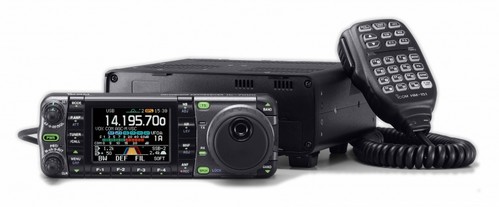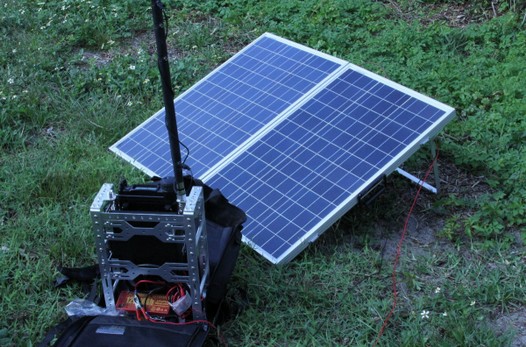Ham Radio F.A.Q.
The subject of Ham Radio, in relation to preparedness, is one that’s often overlooked. When it is talked about, it’s often an afterthought in an article, or it’s presented by someone who has no real experience with radio communication technology.

In my opinion, Ham Radio still plays a very important role in emergency communications and preparedness. If you’re serious about survival and prepping, you really need to look into HAM Radio.
In general, radio communications is a pretty complicated subject; one that can hardly be covered in a single article. That being said, I want to answer some of the most common questions I received about Ham Radio, and why I feel it’s so important to survivalists and preppers.
Why is Ham Radio Still Important?
In an age where communication is often taken for granted, it’s easy to overlook the importance of Ham Radio.
I often receive questions like: “Why do I need Ham Radio when I have a cell phone?” or “Didn’t the internet kill Ham Radio?” While these modern forms of communication may have shifted the attention away from Ham Radio, by no means did it make it unnecessary. In fact, during a disaster, it’s very likely that these modern forms of communication will be the first ones to fail.
The number one reason for preparedness minded people to consider Ham Radio is its reliability during times of crisis. Since the early 1900s, this form of communication has reliably made it through every major crisis, disaster, and emergency situation with flying colours. When all other forms of communication fail, Hams are often the ones who are called upon to help communicate in and out of the disaster zone.
When the grid goes down, the Ham Bands will still be alive and very active.
What about my Emergency Radios, can’t I just use that to get information?
Probably Not! Emergency radios are great; I have a few of them myself, but during a large-scale disaster, they’ll probably become completely useless.
Think about it this way; most Emergency radios have the normal local AM & FM Bands, a few weather channels, and possibly some shortwave frequencies. During a large-scale disaster, most of these radio stations will either shut down because of a lack of power, or they’ll go silent when their employees stop showing up for work.
On the other hand, Ham Radio will be more active than ever. During any kind of disaster, small or large, the Ham bands light up. From being able to monitor local communications, to monitoring what’s happening nationally or even throughout the world, Ham Radio allows you to find out what’s really going on.
One thing to keep in mind about Ham Radio is its operators are independent operators that don’t answer to any corporations or government officials. Yes, you do have to be licensed; but the people you’re listening to are independent operators that have no agenda, not filters, and no reason to lie about the situation. You will be hearing raw, unfiltered news right from the source.
How will I power my Radio when the Grid goes down?
While some radios require massive amounts of power, there are a lot of Hams who enjoy the challenges of operating on next to nothing. In Ham lingo, it’s known as QRPing. And yes, these weird terms and phrases actually mean something and are extremely useful when operating in low power situations.
From using solar, wind, and other alternative power sources to the batteries in your vehicles, boats, or RV’s there are a number of ways to power a Ham Radio after the grid goes down. In fact, some radios can be operated with little more than the batteries in your smoke detector.
Personally, I’ve talked to people from around the globe with less than 10 watts of power. If you really know what you’re doing, you can transmit with even less. I use a Yeasu FT817D, with a battery pack that can be recharged with a small solar panel. Here is an example of one of my solar powered Ham Radio Rigs.

Where can i operate my ham radio?
Fixed operation:
Radio communications conducted from a specific geographical land location shown on the station license.
Portable operation:
Radio communications conducted from a specific geographical location other than that shown on the station license. For example, a vacation home, or a friend’s house. A portable station is a solitary hiker using an HT camping at Lake for a few days. Or, it could a multi-band, multi-mode, multi-operator Field Day Station, with numerous antennas and several transmitters running up to full legal power 24 hours a day!
Mobile operation:
Radio communications conducted while in motion at unspecified locations.
(Note: It’s important to make the distinction between portable and mobile operation. Mobile refers to talking on your Ham Radio while driving, while jogging or while backpacking.
Portable means operation for an extended period of time at a specific definable location, such as your temporary destiontion.
Maritime and aeronautical operation:
Maritime mobile and aeronautical mobile are occasionally heard. You may also hear pedestrian mobile, wheel chair mo-bile, bicycle mobile, equestrian mobile, railroad mobile, or other such definitive terms. These terms attract attention, add to the interest and the magic of radio, and are fun to contact.
Can’t I just buy a Radio without becoming licensed?
No. Each type of equipment, power source, antenna, and communication mode has its own set of strengths, weaknesses and intricacies. Ham Radio equipment isn’t something that you can just pull out of the box during an emergency. Just like every other skill in life, it requires practice; and in the case of Ham Radio, a lot of it.
I refuse to be part of something where I have to be licensed by ICASA
I hear this argument a lot; and while I usually do everything I can to keep government out of my life, in the case of HAM Radio, I feel the benefits far outweigh the risk. So unless you’ve sworn off driving for the very same reasons, I advise anyone who’s serious about learning the ins and outs of emergency communications to take a good look at becoming a licensed Amateur Radio Operator (HAM).
How hard is it to get a Ham Radio License?
In general, radio communications is a pretty complicated subject, one that’s impossible to cover in a single article. That being said, the licensing process itself is actually pretty easy.
Over the last decade, the testing process has been simplified. Some of the past requirements, such as learning Morse code, are no longer required to obtain a license. What’s important here is that almost anyone, with a little bit of practice, can get their license.
How do I Start?
There are two classes of licence, Class A and Class B.


Class A licensees (prefix ZR or ZS) are required to pass the Class A Radio Amateur Examination (RAE) and complete the HF operating certificate, while Class B licensees (prefix ZU) need to pass the class B Radio Amateur Examination and complete the HF operating certificate. ZU licencees are restricted in terms of the bands available, output power and some other minor items. RAE courses are conducted by many clubs around the country. Contact your closest club for more information. The examination is held twice a year, usually in May and October. Click here for a list of examination centres.
Class B (prefix ZU) Age Restriction
Candidates have to be under 20 years old to apply for a ZU licence and when they turn 25 are required to upgrade to class A (ZS or ZR) by writing and passing the class A examination.
Current class B licence holders have until 31 March 2013 to upgrade. After that date their ZU licence will not be renewed.
ICASA NOTICE
The Authority has announced that all persons over 25 years old can no longer renew their ZU licence from 1 April 2017.
With the publication of the new radio regulations earlier this year, the much talked about age restriction for ZU license holders was implemented. Persons under 20 years old can write the class B examination and if successful can hold a ZU or class B license until 25 years old after which, if they would like to continue with Amateur Radio, have to sit the class A examination to qualify for a class A (ZS/ZR license).
During the discussion stage of this new regulation the SARL was requested to approach ICASA to review their decision, which the SARL did at two occasions when ICASA invited comments on their proposal. ICASA strongly believes that the class B license prime purpose was to create opportunities for young people to enter Amateur Radio and based on that premises implemented the new regulation.
The SARL requested ICASA to allow a reasonable period for ZU licences over 25 to upgrade. ICASA agreed to this. The Authority has announced that all persons over 25 years old can no longer renew their ZU licence from 1 April 2017. In a letter to the affected licensees, currently being mailed, ICASA recommends that the affected persons enrol for a class A license course and write the next RAE in May or October 2016 (SARL NEWS 8 November 2015)
Morse Code in South Africa
There is no morse code requirement for an amateur radio licence in South Africa but is still taught and very active on many bands.
Band Plans
South Africa falls within ITU Region 1, and the band allocations are therefore similar to those for Europe and Northern Asia. Click here for the full South African band plans.
Use of Amateur Radio in a vehicle clarified
These regulations can be found in the Road Traffic Ordinance 308A. ( Click here to Download )




